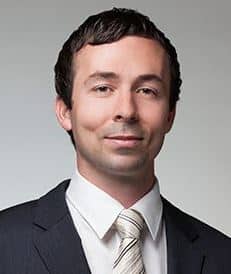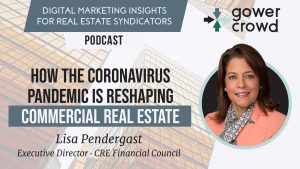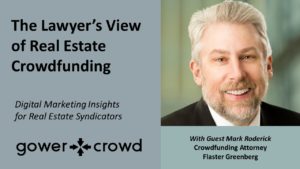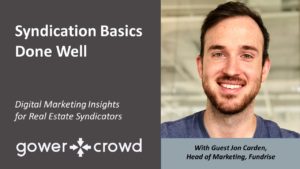WHITE BOARD WORKSHOP
Need More Money to Finance Your Real Estate Projects?
Learn how to find more investors, raise more money, and finance your real estate projects online.
216 Chris Loeffler, Founder & CEO Caliber Companies

Humble Beginnings

Capital
At the time Chris’s financing came from anybody who would talk him. He did not have any family money or any startup capital or formal venture funding or anything like that. He literally would meet people through the random circumstance of life and tell them what he was doing and ask them if they wanted to flip a home and tell them how it worked and go from there.
Chris tells of a time when he had put a non-refundable, $10,000 check down as a deposit on a property at auction. He had 24 hours to pay for the property in full, in cash, or lose the deposit. As he had bought two or three homes already, and only had enough money to fund two, he found himself in a bind with $10,000 on the line. That afternoon, he met somebody at a Starbucks at 4:00 o'clock, told him the story, and the next day had a new investor who wrote a $50,000 check that helped close on the third home.
Fast forward nine years later and Chris’s company, Caliber, has become asophisticated real estate private equity company. They are consistently raising capital into different funds with different profiles; long term for growth, short term for a fixed income, or for the mid-term for a little bit of combination of both. The funds operate independently of the deals so they are always raising capital in the funds because they know that they can deploy it eventually.
Leaders of The Crowd
Conversations with Crowdfunding Visionaries and How Real Estate Stole the Show
Discover how laws that gave us crowdfunding were solely meant to finance small companies and yet inadvertently opened the doors to allow you to invest in real estate like never before.
Read the book and listen to the actual conversations.
Fully Integrated Real Estate Development
Caliber is also a company doing real estate deals across the board. They do hotels, apartments, office buildings, commercial properties, self-storage facilities, single family homes, and all middle market. The company has built itself up to about $300 million in assets under management and has learned sophisticated ways to raise capital from accredited high net worth investors and their wealth advisers.
One aspect of that is that they are conducting a Regulation A+ listing where they are permitted to raise up to $50 million per year while being, in contrast to Regulation D offerings, not restricted to accredited investors only. Indeed, Caliber has found that non-accredited investors are typically a little easier to work with and offer better deal because they have a lower level of expectation for a return on a $5,000 investment than a deeper pocketed, accredited investor.
What makes Caliber especially different in the crowd fund real estate space is that they are operating in many ways like one of the market place platforms, but are actually the sponsor also. Caliber is the real estate manager, is actively the developer, actively buys the deal and conducts the deal making structure and finance, the do the construction and construction management; everything. They are not an intermediary, and not a platform. Caliber is a developer with truly vertically integrated platform. By taking this broad role, Chris finds that they can get very close to the deals and that sometimes that can give them a competitive advantage in the marketplace.
How to Fund Your Deals
7 Steps to Raising Equity Online
From Private to Public
Caliber has a $100 million commercial asset fund that is a bigger fund than they could do under Reg A, in addition to a Reg A for the parent company. They are seeing competitors who have started to create child funds for $100 million, $200 million, $billion funds and for which they will create a mini new company. That company will be taken through all the Reg A requirements, which are not that difficult, and they will raise $50 million into that offering.
The only purpose of that company is to buy a piece of the larger accredited investor fund and so in essence provides the non-accredited investor, for the first time ever, a legal way to invest just like an accredited investor would. They might pay a small spread in fees or something like that versus what the accredited investor spends, but at the end of day individual investors, who otherwise would not get access to these types of wealth building tools, can now get access.
For Caliber, their Reg A+ offering is effectively turning them into being a public company. They will file a 10k at the end of the year and a mid-year report; no need, under Reg A+, to report four times a year. The reporting requirements give investors a lot more transparency into the business in comparison with investing into a private company which is something of a trade off. But the cost to maintain that reporting can still be manageable and, either way, running $50 million of other people's money, Chris figures is going to be just the same type of external audits and hard core financial reporting that he would need to do anyway if they remained a private company.
What Caliber is using the Reg A offering for is as a bridge to take the overall company, the parent company and take it public. This entity acts as the general partner and has their equity and their interest and all of the assets that they own. It holds all the control positions they have and all of their funds as well as their operating companies; their real estate company, brokerage, property management, construction, development. All of these businesses are rolled up into a single entity, and that entity is doing the Reg A+ offering to raise up to $50 million to become a public reporting but non-trading company.
As a result, for the first time ever non-accredited investors can own a piece of Caliber. The second phase of this will come at the end of 2018 when they plan to list the stock on the Nasdaq and become a NASDAQ traded company.
Deal Types
Caliber looks only to middle market deals. These are assets that are typically too big or too complex for a handful of doctors to get together, open an LLC and buy. They are not typically $2 million, $3 million deals that are small enough that a couple of people can get together and buy. On the larger side they buy assets that are smaller than $40 or $50 million in check size to do the entire deal which are usually properties that are approaching the size that institutions like a REIT, like a public REIT or insurance company might buy. Caliber does not want to compete with people who have money that costs almost nothing to deploy, and they don't want to compete at too low of a scale with smaller investors who are really scrappy and can afford the time to be able to work the deals at that level.
Deal Criteria
Chris stays away from asset classes that are hyped up, although that can change over time. For example, there is a lot of hype around assisted living and student housing and apartments currently. Having said that Caliber are doing student housing projects and have looked at assisted living projects, so there are always exceptions that prove the rule.
Caliber has an underwriting model that they think of as being elegant and simple. They want to buy an asset where they are getting better than 20 percent discount to market; for less than they we believe the asset is inherently worth. In addition, they want to see that after completion, the asset can exit at a 10 cap. What that means is that if they buy an asset for $500,000 put $500,000 renovation into it, by the time they are done with the transformation it will make at least $100,000 a year in profit – or a 10 percent cap rate or a 10 percent rate of return. Then, last but not least, they look for properties with a story. Every deal with a story has the ability to transform the property in some way shape or form so it it is a real deal you can you execute on the plan.
Challenges
The culture of the real estate industry is that a lot of real estate entrepreneurs are pursuing a lifestyle business. If they get good at it and know what they are doing, even in a very small shop they can make a really nice income. And as they build a reputation over years and years with about 20 or 30 investors which is pretty easy to manage, you can build into a multi-million dollar business. It is not as easy as it sounds, but it is not so difficult once you understand what you are doing.
The problem is if you want to build a real company into a real enterprise that is going to be something beyond something that is just there to serve your needs and your lifestyle. It is a path that is very difficult. There are no banks that view you especially as a small real estate investment company as a lendable entity. They might lend you money on your real estate assets but they will not lend you the money to build your business. As you build your business you are going to make bad hires you are going to pick the wrong software, waste money on a strategy that does not work, and will be doing this on a fixed income from fees upfront and along the way, but with most of your money comes from the profit. And you might not see that profit for three to five years.
For Chris, every year for nine years his partners and he have had a look at each other and said, you know, do we want to make money personally or do we want to build the company. Those, for Chris, are mutually exclusive things. As the company goes public that will allows him to be able to get beyond the main hurdles that stop a company like Caliber from being able to function the same way as if they, for example, manufactured toasters where they would be much more supported in the community in terms of lending relationships and equity capital. But for his type of business there is really no clearly defined path for growth and a lot of regulatory risk; a lot of execution risk that goes along the way.
Once the company goes public, Chris is confident that the world will change for Caliber. They will become a lendable company and it will be a lot easier to raise capital. But that has been a 10 year process with a lot of risk along the way
The Impact of Crowd Funding
The real estate industry has been due for change for a long time. If you look at around at our neighborhoods in our communities, there is a reason why you see so many Walgreens in why you see so many strip malls that look relatively the same. And yet when you look at going to these retail outlets where they do look very different is where there are local restaurants and local shops. Why are they these places always packed?
The answer to that, in Chris’s mind, is that everything in real estate at a large scale has been driven by the public capital markets and institutional capital investing into deals. And what does institutional capital like? They like do the same deal the same way the same time a thousand times across the country so that they can put $2 billion into the strategy to keep it efficient for everybody.
But what real estate is local. It is hyper local. It is one thing on one corner on one street that is different from different corner 1,000 feet away. So what people really want is the local coffee shops. They really want the local shopping experience. And they really want that kind of experience in an office space and in retail etc. and because of that, these crowd funding mechanisms are the thing that will bridge that gap. People are going to start investing in their own communities.
Indeed, 60 to 70 percent of Caliber investors are Arizona residents and they love investing in projects that they can drive by and see that they own a piece of that hotel or the self-storage facility. And in addition to that developers are going to be able to say “you know what, I want to build this really quirky, weird mixed-use type deal here on this corner. I'm going to put a sign up on my property and offer it out to the community to support my project by voting with their dollars. And so all of those things are changing the real estate business because that capital is cheaper than the normal sources of capital. And it is allowing me to build a project that's frankly more profitable.”
Community
Chris thinks it incredibly useful to have local investors for everything. For finding additional investors, for assistance through entitlements, knowledge and support at neighborhood meeting. When you have somebody who owns another business that is well respected saying that they support the project is fantastic.
Most CEOs of private real estate companies and in the investment business generally avoid talking to their investors pretty much at all costs and when they do they have very structured communications so that they do not have to be in a situation where they said or did something wrong. Chris’s philosophy is the only thing that gets them in trouble with their investors is not having a relationship with them. If something goes wrong and he cannot lean on the fact that they know they are trustworthy people and are just working through a problem because real estate problems occur, then you know that is the big issue.
If you are in the real estate investment business and you think that the most important thing in the business is the deal, Chris thinks you have lost sight of what really matters. It is the relationships; the investors, and it is all about making them happy. If you have good quality equity investors and good relationships Chris Loeffler is confident that the deals will almost always be there.
RELATED PODCASTS
383 Lisa Pendergast, Executive Director of CRE Finance Council
Last Updated on November 2, 2020 by Dr. Adam Gower Lisa Pendergast, CRE Finance Council How the Coronavirus Pandemic is Reshaping Commercial Real Estate NEW BOOK BY ADAM GOWER PH.D.…
READ MORE >316 Mark Roderick, Attorney, Flaster Greenberg
Last Updated on September 15, 2021 by Dr. Adam Gower NEW BOOK BY ADAM GOWER PH.D. A BRAND NEW WAY TO FINANCE REAL ESTATE …No matter how many investors you…
READ MORE >310 Jon Carden, Head of Marketing, Fundrise
Last Updated on September 15, 2021 by Dr. Adam Gower WHITE BOARD WORKSHOP Need More Money to Finance Your Real Estate Projects? Learn how to find more investors, raise more…
READ MORE >












